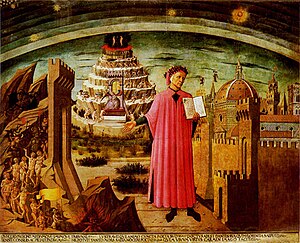
In this series I detail
the few series I have given a 5/5 too and why.
What is it?
The Divine Comedy written
over the course of 12 years is an epic poem by Dante Alighieri after he was exiled
from his home city of Florence by his political opponents.
The series details Dante’s
journey through Hell, Purgatory and Finally Heaven, the whole of which is
allegorical of the soul’s journey from darkness into light, as Dante discusses
and learns of the underlying divine nature of the whole of the cosmos.
Why do I love it?
When I say I love The Divine
Comedy, I often get one of two responses:
A: Wow that’s really
intellectual, I could never read that!
B: Wow…you’re just trying
to look smart.
When it comes to the
second position, that position really makes me sad because I do have a genuine
love for the Divine Comedy and am perfectly willing to discuss it anytime or
way you want. I don’t just make myself like it to look smart or have a sort of
dry intellectual appreciation for The Divine Comedy and its importance in art
history, I really do enjoy reading it and love it.
The second position I am
more sympathetic towards, but if you have any desire at all, I would recommend
trying it, it’s actually not as hard as you might think. Dante was specifically
trying to write for the common man, which is why he wrote in Italian instead of
Latin, which itself was very strange back in the day.
What I really love about
the Divine Comedy is just how comprehensive it is, how it covers all the
studies known to man at the time of it’s writing. Dante too me seems the sort
of archetypal renaissance man with his knowledge of just about all the
classical fields; history, mythology, theology, astronomy, biology, physics,
philosophy etc. and he puts all of that into his writing and it all just comes
together into a world that feels so much more unified then almost anything else
I’ve ever seen.
And what really ties his
world together as well as another reason it’s not as hard as you might think to
read is the theme throughout of love, divine love, which permeates all the
cosmos. Dante’s artistic descriptions of the three worlds are interesting on a
purely intellectual level, how each one is symbolic, but just on an emotional level
his poetry is beautiful. The Divine Comedy is the antithesis of a cold ancient
artistic obelisk.
The dual themes I see in
Divine Comedy unified are the uniformity of rules, everything from gravity to
justice work the same perfectly proportioned to all scales with the same rules
ruling our mundane actions and the stars above, as well as the importance of
the individual. Dante’s writing is to me an important shift in the artistic consciousness
from writing about perfect saints and knights and heroes to writing about
himself, a normal common man, and ends with him fashioning the whole cosmos to
his ideals, the root of the important recognition of the importance of the
individual. It doesn’t matter that you aren’t a god or a king, you are still
important. All the primordial powers of nature that rule the universe are
around you and your actions.
5/5 Moments:
*When Franchesa reveals
to Dante her affair inspired by love poetry and Dante faints realizing the
effect art likes his own has on society and the power of art
*Dante’s anguish at the
fate of the damned and his plea for mercy for them
*The depiction of
treachery, a horrible frozen place perfectly depicting the stifling of God-given
creativity and potential and the eternal stillness that comes from evil where
nothing can ever be born from
*Virgil persuading to
pass through the flame of the terrance of lust in Purgatorio by reminding him
of his love Beatrice, his love for Beatrice, the woman who his love leads him
to become virtuous before, overcoming his fear of confronting his sin
*Dante finally reuniting
with Beatrice at the end of Purgatorio
*The contemplation of
Earthly Justice and Divine Jupiter on Jupiter in Paradiso where Earthly Justice
is shown to be the mere surface of the water of the entire ocean of Divine
Justice
*The contemplations on
predestinations and wisdom on Saturn
*Dante ascending into the
constellation of his birth, The Twins looks back unto the Earth and speaks of
how we struggle and do all manner of evil things for such petty things on a
tiny orb and returns his gaze unto the stars
*Dante in the fixed stars
at the edge of the universe seeing the whole of the universe moving in perfect unison
in nine concentric spheres marveling at the wonders of creation
*Dante ascending to the
Empyrean, the abode of God and beholding the flower of divine love from whom
angels like bees bring peace and love throughout the whole cosmos
Favorite Moment:
The Final Canto where
Dante sees God and the whole of the cosmos is reflected, as he realizes himself
in the cosmos, seeing how the same love that moves the sun and all the stars, that
determines the greatest movements of the cosmos so too in harmony move his will
and want, moving him in perfect unison with the cosmos, a beautiful reflection
on the nature of reality as being regardless of scope, with the great and the small
reflecting the simplest smallest mundane action reflecting all the glories of
God and the virtues.
“But already my desire
and my will
were being turned like a
wheel, all at one speed,
by the Love which moves
the sun and the other stars.”
No comments:
Post a Comment